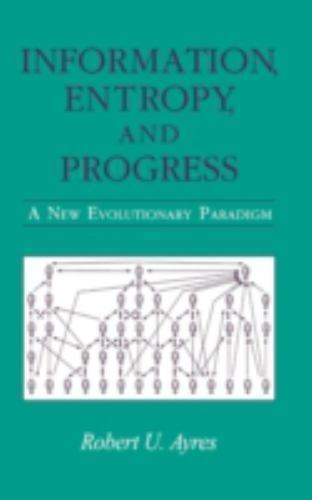Book Review 2025.02: Information, Entropy, and Progress, A New Evolutionary Paradigm, 291 pages, 1994 -January 28, 2025

A key resolution for the year 2025 is to read the unread books in my collection. This is the first of those books completed that was with me for more than ten years. After reading it over the last twenty-five days, I realized why I had not progressed despite picking it up more than a dozen times. This book is abstract, introducing more than a dozen new concepts for me from physics, chemistry and engineering in viewing social systems, and more particularly the economic system, which is primary interest. Further it contains many mathematical equations to derive certain key conclusions that is quite forbidding. To be honest, I skipped over the mathematical equations and focused on the conclusions and a few key variables that I found interesting.
The author takes the reader though the evolution of the universe, earth, its geological and biological spheres, living organisms, social, and economic systems before focusing on the developments in manufacturing, production and labour. This book provides a universal perspective that is not limited by any domain or discipline as is the normal case. Hence, this unique universal perspective is both the book’s positive and at the same time its limitation.
Among the many new concepts and ideas that I came across in this book, I found the following few that made me look at the world around me with a different lens:
- Two views on evolution – Darwinian or the hard evolution and Lamarckian or soft evolution of transmitting acquired qualities.
- Completion of the life cycle traced through carbon: of fermentation generating carbon-di-oxide, photosynthesis using carbon-di-oxide to release oxygen, and respiration using oxygen to release carbon-di-oxide and complete the cycle.
- Fitness in social context viewed in humans as changing from reproductive success to economic success; a shift from quantity to quality?
- Evolution of life on this planet as a progression towards higher intelligence. Intelligence defined as ability to adapt self to environment and/or ability to adapt the environment to self.
- Evolution of cooperation as a product of voluntary decisions, memory of prior interactions and farsightedness.
- Prisoners’ dilemma and the tragedy of commons being the two current challenges identified in adoption of cooperative decision making on a larger scale.
- Technology can be embedded only in labour skills, machinery or organisational structures.
- All knowledge is information, but not all information is knowledge. Knowledge is dependent on the individual. A smart individual can infer more knowledge form a given set of information.
- Capital equipment as an extension of human organs; knives and chisels of nails and teeth, club and hammer of fist, wheel for legs, clothing, roof and walls of human skin, sensors, microscope and telescope of eyes, and calculators and computers of human brain.
- Economics while studying economic goods, ignores environmental bads, as it has not enforced the Polluters Pay Principle effectively.
I see this book as a reference book to be used while analysing nascent development in different disciplines and technology to see if they confirm to the universal trends for it to be sustainable. Its relevance in tracing the developments in the field of AI may be of value to the interested readers.
Happy Reading and wishing you all the time and focus required to read this conceptually rich in ideas book.
For more book reviews and blogs visit my site www.shankarjagansworld.com.

Social Profiles